687 Search Results for communication book
July 26, 2013
by Robin Parker -
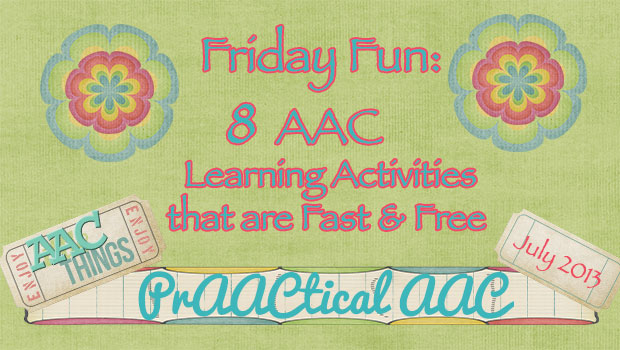
Get ready to increase your AAC knowledge in a fun and fast way. Read, watch, share, & learn: Learn about Ablenet’s updated AAC app: Sounding Board- Bigger and Better. Read past AAC Newsletters: Augmentative Communication, Augmentative Communication News (ACN). Check out Talk About Food app and enter to win it. Learn about Literacy and AAC by checking out Jane Farrall’s blog or 101 Ideas for Literacy & AAC. Watch a recorded Ablenet webinar on a variety of PrAACtical AAC topics presented by AAC leaders. Read Think Inclusive’s– 7 Ways to Use a Sequential Message AAC Device in the Inclusive (or any ) Classroom Join an active AAC friendly facebook group such as Speak For Yourself, Raising and Teaching Individuals with Severe Disabilities, Proloquo2go Professionals, or any other you know of. Learn about AAC (and other) strategies to help prevent wandering: Big Red Safety Tool Kit, Social Stories
July 19, 2013
by Robin Parker -
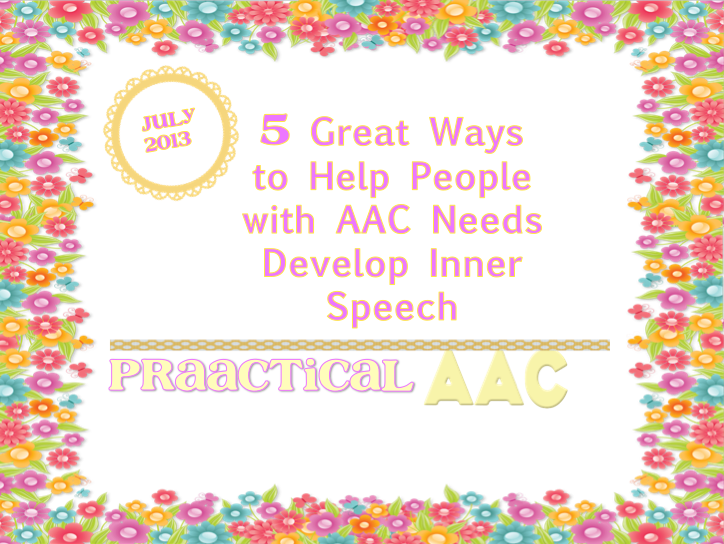
Inner speech is important. Recent research has strengthened our belief that developing inner speech is an important strategy for many people who use AAC and are working to build their literacy, sensory, and language skills. But how do we teach someone to develop that inner voice? Here are some ideas. 1. Begin by using a ‘think aloud’ strategy to make your internal thought processes obvious to the person who uses AAC. Articulating your thoughts as you work through different communication and literacy learning processes gives the learner insight into what you are thinking. Once they are used to that, it is easier to introduce the concept of private/inner speech. – 2. Use explicit instruction. “Say it to yourself.” “Say it in your head.” Using natural gestures, like tapping your temple, can be helpful as well. We’ve found that this allows us to reduce the prompting over time. Fade the verbal prompt and... [Read More...]
July 9, 2013
by Robin Parker -
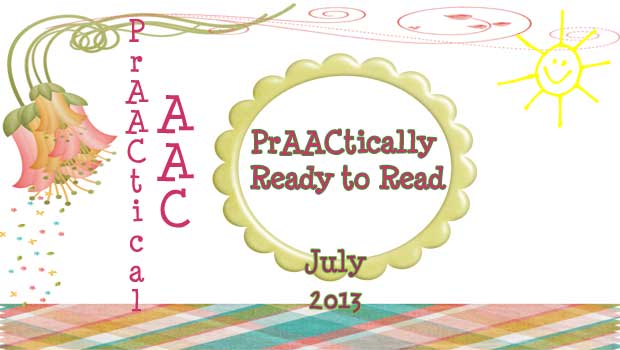
It’s summer and hot where we live (really hot!), humid (really humid)!. This weather makes it a good time for quiet, peaceful activities. Reading is high on our list. No pressure, enjoyable reading. We want ALL learners to enjoy reading. From simple single message voice output devices/apps to high-tech core language based SGDs and everywhere in between, there are lots of prAACtical opportunities for communication building, literacy learning, and just plain fun through reading. Interactive reading, reading aloud to someone, or reading to yourself can all be done in air-conditioned homes or libraries or by the pool or beach where you can cool down with a quick swim. Here are some great resources for adapted books, communication boards to go with books, and visual supports to help with reading. Find a good book, stay cool, and enjoy: New York City Department of Education: Adapted Books Baltimore City Schools- Book Specific Communication... [Read More...]
July 8, 2013
by Robin Parker -
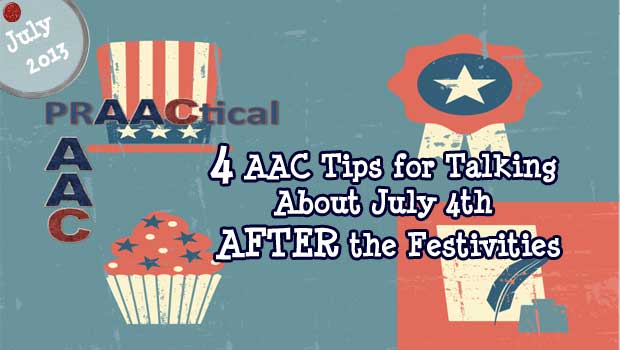
Make a Plan – Schedule a time to ‘talk about the past event (July 4th). The plan can include a ‘talk time’ or a time to collect remnants, photos, or related items from the event. Use a calendar or schedule to plan AAC style. Put Together A ‘Talking’ Photo Album– Gather all the photos from the activity and put together a talking photo album. You can use any talking photo album where you record a voice or use a story creation app that has recorded (digitized) or computer generated speech (synthesized). The process of making the photo album can be the ‘past event’ conversation and/or a review/reading can be the ‘conversation’. For some learners, turning the pages is the beginning of talking about past events while for other learners the pictures will be the opportunity for the conversation. It is helpful to use text and speech as you create the... [Read More...]
June 26, 2013
by Carole Zangari -
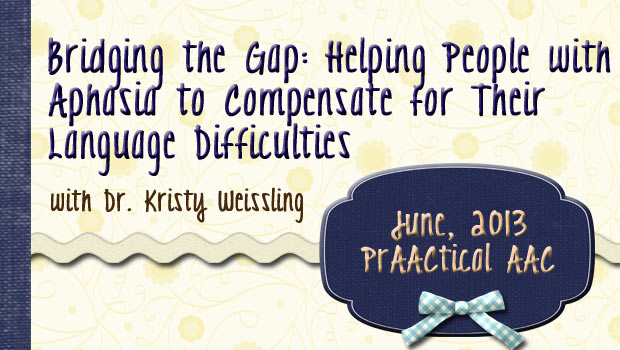
We’re wrapping up Aphasia Month with another fine post from Dr. Kristy Weissling. You can see her earlier posts here and here. In this post, Kristy shares her thoughts on how SLPs can use AAC supports to help individuals with aphasia compensate for their language difficulties. In 2010, my colleague, Carrie Prentice, and I talked about the role of both remediation and compensation in the speech rehabilitation programs of people with aphasia. At that time, we were trying to emphasize that at any particular time in the rehabilitation process, from acute care to outpatient rehabilitation, all possible alternatives should be balanced to create an individualized treatment program. Both restorative and compensatory mechanisms are available to therapist throughout this process. We proposed the work of Dixon, Garrett, and Backman (2008) to formulate a framework for discussing compensation. Six mechanisms of compensation were identified in their chapter on principles of compensation in... [Read More...]
June 17, 2013
by Carole Zangari -
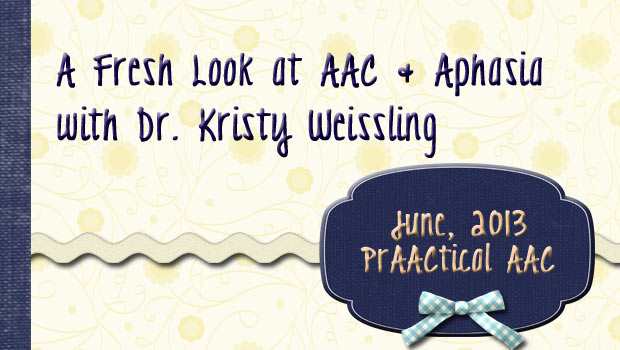
We’re so pleased to be able to share the thoughts of our friend and colleague, Dr. Kristy Weissling, on providing AAC supports to people with aphasia. She received her professional doctorate from Nova Southeastern University and is currently an Assistant Professor of Practice and clinical supervisor at the Barkley Speech-Language and Hearing Clinic at the University of Nebraska-Lincoln. Her research and teaching interests include, aphasia, cognitive communication impairments, and AAC. She participates in implementation of a portion of the RERC grant project at the University of Nebraska-Lincoln. She has been an instructor in aphasia and cognitive linguistic impairments for 15 years and teaches in both online and live formats. Her clinical load includes individual and group treatment of individuals with aphasia, traumatic brain injury, and early cognitive decline. In this post, Kristy reflects on three articles that have shaped her clinical services and teaching. :::::::::::::::::::::::::::::::::: I have been working with people who... [Read More...]
June 13, 2013
by Carole Zangari -
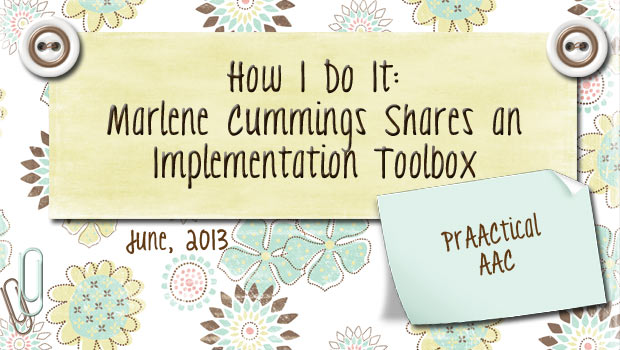
Now that the school year is winding down, some of you have a little more time to read, process, and prepare for next year. We are really excited to share more ideas from Marlene Cummings, one of the most experienced AAC SLPs that we know. Those of you who have been following Marlene’s posts on the AAC implementation will be pleased to see the next part of the Framework for Success that she developed with the AAC Team at Oakland School District. If you missed her first and second posts, go take a peek at them when you can. 5 Things in our “Implementation Toolbox” When we begin the process of implementing AAC it is important to consider our “thinking”. We always want to approach every student, every team and every classroom with as much wisdom and respect as possible. One of my colleagues, Dr. Penny Hatch, from UNC Chapel Hill... [Read More...]
June 5, 2013
by Robin Parker -
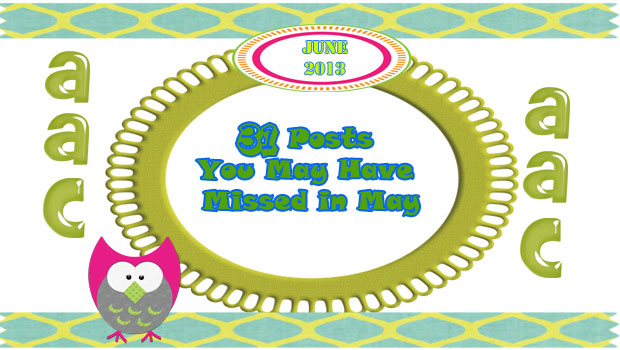
Strategy of The Month Communication Boards: Colorful Considerations Communication Boards Can Be Used For…. A Lot I Made A Communication Board: Bow What Join Together: Core & Fringe Vocabulary Fresh Look AAC in the Classroom with Joan Bruno Friendship Skills for Children Who Use AAC with Dr. Erinn Finke Top 5 Switches for People With ALS by Amy Roman AAC & Dementia with Dr. Melanie Fried Oken AAC for Children Who Have Rett Syndrome with Dr. Theresa Bartolotta AACtual TherapyHow We Do It Essential Tricks for Supporting AAC in Schools, Part 2 PrAACtical Look: AAC at Dynamic Therapy Associates by Vicki Clarke A Framework for Success Getting Started in the Exciting World of Communication & AAC with Marlene Cummings AAC Myth Buster Wrap-Up PrAActical Thinking It’s PrAACtically Better Hearing & Speech Month 30 Posts You May Have Missed for Autism Awareness Month It’s PrAACtically Mother’s Day- 5 Activities that Support... [Read More...]
May 16, 2013
by Robin Parker -
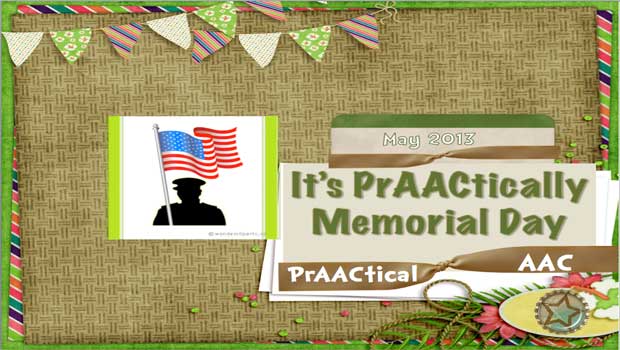
It’s PrAACtically Memorial Day! Memorial Day is prAACtically here. We remember, appreciate, and honor the people who have protected our freedoms. Getting ready so EVERYONE can participate is important. We wrote about memorial day last year and had found some good gluten-casein free Memorial Day recipes. There are even more resources today. Check out Gluten Free Memorial Day Weekend Menu and Recipe Ideas or Gluten Free Casein Free Applesauce Muffins. Cooking and baking provide meaningful language experiences as well as just plain fun. There are symbol based recipes on Pinterest at Picture Recipes and Visual Recipes for Children with Autism, and at Specialty Chef. There are also prAACtical AAC ways to teach about Memorial Day’s meaning as well as the typical memorial day vacations, activities, and events. Learning about Memorial Day Memorial Day Activity Board Memorial Day Vocabulary Cards Memorial Day Bingo Memorial Day Adapted Bingo Summer Pack Memorial Day After learning about Memorial... [Read More...]
May 9, 2013
by Carole Zangari -
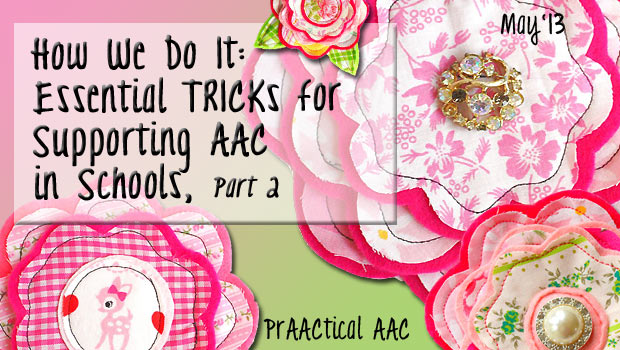
Today we welcome back 3 SLPs from the Orange County Public School (OCPS) AT team, Cathy George, Marcia Sterner, and Marcia Piersall. They are part of a very active and competent AT Team that supports over 700 students with dedicated AAC devices. It is no surprise that they’ve come up with a list of 5 essential TRICKs that they count on to help them support these students and their educational teams. You can read about the first 2 TRICKS, Try It and Resources, here and download some of their terrific resources. Today, we learn about the rest of their TRICKs: Information, Can’t Live Without It, and Kick It Up A Notch. Give Me Five: Essential TRICKS, Part 2 INFORMATION about the student Student interests What systems previously tried What tasks s/he is struggling with Trial data sheet– Communicative competence organizer CAN’T LIVE WITHOUT IT: In addition to AAC devices, these... [Read More...]









